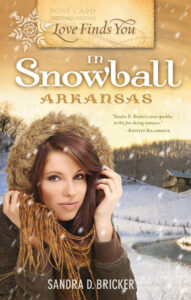calsfoundation@cals.org
Embracing the Random
I believe that it’s important to add a bit of randomness to one’s life. We can be too often confined to our narrow tastes, especially in these days when unseen algorithms dictate much of what we see online or even experience in the real world. Preserving a bit of randomness is a survival technique for the mind and soul.
 I like to do this with books, especially. One of the best purchases I ever made was in Blytheville, Arkansas, where an old used bookstore was being emptied out by the owners of the building, with everything on sale at the cost of $40 per 500 items, or eight cents each. During this binge, I picked up a copy of a novel titled The Miracles of Antichrist by Selma Lagerlöf. Some weeks later, I was deep into this book, turning each page struck with wonder at the plot and the beauty of the prose, translated from the Swedish. At this time before one could order whatever one wish from online retailers, it did me no good to learn that Selma Lagerlöf was the first woman to win the Nobel Prize in Literature, because her books, though once popular in the United States, had fallen out of favor and no longer remained in print.
I like to do this with books, especially. One of the best purchases I ever made was in Blytheville, Arkansas, where an old used bookstore was being emptied out by the owners of the building, with everything on sale at the cost of $40 per 500 items, or eight cents each. During this binge, I picked up a copy of a novel titled The Miracles of Antichrist by Selma Lagerlöf. Some weeks later, I was deep into this book, turning each page struck with wonder at the plot and the beauty of the prose, translated from the Swedish. At this time before one could order whatever one wish from online retailers, it did me no good to learn that Selma Lagerlöf was the first woman to win the Nobel Prize in Literature, because her books, though once popular in the United States, had fallen out of favor and no longer remained in print.
However, sometime later in my undergraduate career, I was spending my first days at the Japanese university where I would be studying for the next year, when there sat in front of me at the dormitory cafeteria something of a mirror image to myself. We started talking, and when he said that his name was Henrik and he came from Sweden, I asked if he happened to know about my new favorite Swedish writer. “Of course!” he said very enthusiastically (for a Swede). “She is from Värmland, where I am from! You know about Selma Lagerlöf? When we finish up this year here, you should follow me home, and we can visit her old house, which is now a museum.”
And so I did. Not only do Henrik and I remain in touch, but after finishing my doctoral dissertation, I decided to take up learning Swedish, and this led me to discovering some local Swedish speakers here in Little Rock. Now I have quite a few more friends than I did, all because back in the mid-1990s I grabbed a random book that cost me all of eight cents in the middle of Blytheville, Arkansas.
I try to keep up the habit of occasionally reading something outside my own personal algorithm. Usually, this entails the odd academic monograph on something entirely outside my area of expertise. One of my favorites is Don Cameron Allen’s 1971 Mysteriously Meant: The Rediscovery of Pagan Symbolism and Allegorical Interpretation in the Renaissance, a copy of which my wife bought for me from a professor who had come into the university bookstore looking to offload some cargo before another move. A delightful and witty volume and well worth the ten dollars or so my wife had to pay for it.
But sometimes, I veer into the rather unexpected. One of the things I do here at the CALS Encyclopedia of Arkansas is do the occasional web search for forthcoming books related to Arkansas. Thus, earlier this year, I happened upon news that Harlequin, the world’s largest publisher of romance novels, was releasing a three-volume series titled “Arkansas Special Agents,” set in northwestern Arkansas. Now, we already had entries on romance novels set in the state, such as The Witness and Courting Miss Hattie, so I added this new series to our database of potential entries, thinking maybe down the line someone else would write on it. But I also happened to mention these Harlequin books to an editor for whom I do the odd freelance writing work, and she wanted to know if I’d be willing to write up a book review, albeit a somewhat humorous one.
Why not? If I’m going to embrace randomness, might as well take it in all its forms.
But being a diligent researcher, while waiting for those books to arrive, I started looking around for other romance novels set in Arkansas so that I had grounds for comparison. There were many more than I had imagined, including a number of Christian romances, such as Promise Me Always, Along Came a Cowboy, Love Finds You in Snowball, Arkansas, and A Wedding Date in Hot Springs, Arkansas. But there was also the likes of Wild Child by bestselling author Molly O’Keefe and a three-volume series called “Rumor Has It…” published by Silhouette in the early 2000s. There was also a 1989 historical romance published by Harlequin, Delta Pearl, centered upon the “pearl rush” in Arkansas. How had I never heard of any of these?
Because I had also written, over the summer, a freelance review of the documentary series Shiny Happy People, I ended up reading the two memoirs published this year by sisters in the Duggar family: Jinger Duggar Vuolo’s Becoming Free Indeed and Jill Duggar’s Counting the Cost. Add into the mix a book I found in one of my searches, Joan of Arkansas, which constitutes a retelling of the story of that famous female French freedom fighter, in mixed-media mélange of poetry and prose. Far from my usual fare but fascinating in its own right. Happening upon this book also led me to a rather bizarre unaired 1958 television pilot of the same name starring Joan Davis, something no Arkansas historian I asked even knew existed.
Writing a book or movie review isn’t just producing a summary with added commentary. Both review writing and encyclopedia entry writing entail what Mortimer J. Adler and Charles Van Doren, in How to Read a Book: The Classic Guide to Intelligent Reading, call “canonical” reading. This means reading something within a broader context and understanding a particular work’s place within the broader literary ecosystem—both those works that influenced it and those works it influenced, as well as to what a particular work was responding, or maybe also how certain themes or arguments or motifs within a work parallel works to which it has no immediate relation. So writing an entry for the EOA on a particular book means understanding it canonically in its relationship to similar books, especially with regard to how the state is portrayed, or the location where its action purportedly takes place, even if fictional.
Henry Glassie, the famous folklorist and author of Passing the Time in Ballymenone, an exploration of Northern Ireland’s folklore, described his particular approach in writing about other cultures as working to represent them so that their members would recognize themselves in his writing. That was his measure of success. Now, for many writers I spent my summer surveying, the state of Arkansas just serves as a stand-in for someplace rural, insular, and isolated that has too many secrets for its own good. Honestly, for some of these books, one could have substituted most any state for Arkansas and not affected the plot much at all.

However, I also found myself pleasantly surprised when Arkansas was used more specifically. The series that set off my odd literary wonderings, “Arkansas Special Agents,” actually captures very well many of the tensions lying beneath the rapidly urbanizing northwestern corner of the state. The earlier Harlequin novel Delta Pearl makes excellent use of Arkansas’s “pearl rush” as the key driver of the plot. The state doesn’t have to be represented positively to be represented well, and these books, despite their utter lack of literary pretensions, made excellent use of the state’s history and culture.
In a similar vein, I found myself mulling over the two books by the Duggar sisters more than I had otherwise expected. I do not share their current religious or political outlooks, but I nonetheless found it oddly rewarding to read both of them engage seriously with their upbringing, their involuntary fame, and the ideologies that ruled their younger lives.
I do believe that we all need to allow a bit of randomness into our lives. So much of our online existence is designed to feed us much more of what we have already evinced an interest in. The algorithm does not have a varied diet for us as its fundamental goal. More of the same is its rule. Aside from their Arkansas connections, romance novels and reality star memoirs would likewise not have popped up on any internet site for me. “Because you read G. W. F. Hegel’s The Phenomenology of Spirit, you might also like Along Came a Cowboy.” I think not. But it was an entertaining and rewarding indulgence in a bit of randomness, and I can honestly say I learned a lot from it.
***
And because we want to share that experience, the EOA has recently added to the website (thanks to our developers, Army of Bees) a button on the homepage, right under the search box, labeled “Surprise me!” that will take you to a random entry or piece of media.

Take in something you may never have otherwise expected to clap your eyes on. No matter how well you know this state, there will be something you never imagined would relate to Arkansas, as I myself have discovered. One click is all it takes. (And you have the chance to “roll again” once you are in the randomly chosen item.) Trust me—you will be surprised by what you find. And well rewarded.
By Guy Lancaster, editor of the CALS Encyclopedia of Arkansas



